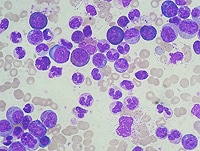FDA Approval for Ixabepilone
Brand name: Ixempra™ (this is old news)
- Approved for breast cancer
Full prescribing information is available, including
clinical trial information, safety, dosing, drug-drug interactions, and contraindications.
On October 16, 2007, the U.S. Food and Drug Administration (FDA) approved
ixabepilone for injection (Ixempra™, made by Bristol-Myers Squibb) for the following two indications:
- Ixabepilone is indicated in combination with capecitabine for the treatment of patients with metastatic or locally advanced breast cancer resistant to treatment with an anthracycline and a taxane, or whose cancer is taxane resistant and for whom further anthracycline therapy is contraindicated.
- Ixabepilone
is indicated as monotherapy for the treatment of metastatic or locally
advanced breast cancer in patients whose tumors are resistant or refractory to anthracyclines, taxanes, and capecitabine.
A
randomized, multinational, open-label trial of 752 patients with locally advanced or metastatic breast cancer evaluated the
efficacy
and safety of ixabepilone (40 mg/m2 IV once every three weeks) plus
capecitabine compared to therapy with capecitabine alone. Patients had
previously received an anthracycline and a taxane, had evidence of
disease progression or resistance, or, in the case of the anthracycline,
received a minimum required
cumulative dose.
Treatment arms were balanced with regards to prior therapies, disease sites,
hormone receptor status and
HER2 expression. Patients receiving combination therapy had a
statistically significant improvement in
progression-free survival (PFS), defined as radiologic progression or death from any cause (hazard ratio 0.69, p<0.0001). The
median
PFS was 5.7 months in the combination arm and 4.1 months in the
capecitabine alone arm. Patients in the combination arm also had an
increased objective tumor
response rate. Survival data for this trial are not yet mature.
Ixabepilone
monotherapy was evaluated in a single arm trial of 126 patients with
metastatic or locally advanced breast cancer who had previously received
an anthracycline, a taxane and capecitabine, and who had disease
progression or, in the case of the anthracycline, received a minimum
required cumulative dose. Ixabepilone was administered at the same dose
and schedule as in the combination trial. The
objective response
rate based on independent radiologic review was 12.4 percent (95
percent CI: 6.9, 19.9). The objective response rate based on
investigator assessments was 18.3 percent (95 percent CI: 11.9, 26.1).
The median response duration was 6.0 months (95 percent CI: 5.0, 7.6).
Treatment with ixabepilone caused new or worsening
peripheral neuropathy
in approximately 65 percent of patients treated. Grade 3 or 4
peripheral neuropathy occurred in 23 percent of patients treated with
ixabepilone and capecitabine, with no grade 3 or 4 peripheral neuropathy
reported in the capecitabine arm. In the ixabepilone monotherapy trial,
14 percent experienced grade 3 or 4 peripheral neuropathy. Neuropathy
was generally reversible to grade 1 or better with cessation of therapy.
Ixabepilone in combination with capecitabine resulted in a 68 percent incidence of grade 3 or 4
neutropenia
compared to 11 percent with capecitabine alone. Twelve patients
receiving ixabepilone in combination with capecitabine died from
complications arising from neutropenia.
The incidence of neutropenia related deaths was higher in patients with baseline moderate or severe
hepatic
impairment when treated with both ixabepilone and capecitabine. This
combination should not be used in patients with moderate or severe
hepatic impairment. When used as monotherapy, 54 percent of patients
treated with ixabepilone experienced grade 3 or 4 neutropenia.
Other commonly observed toxicities (>20 percent) included
anemia,
leukopenia,
thrombocytopenia, fatigue/
asthenia,
myalgia/arthralgia,
alopecia, nausea, vomiting,
stomatitis/
mucositis, diarrhea, and
musculoskeletal
pain. The following additional reactions occurred in ≥20 percent in the
combination treatment arm: palmar-plantar erythrodysesthesia
(hand-foot) syndrome, anorexia, abdominal pain, nail disorder, and
constipation.
This summary was provided by Richard Pazdur, M.D., director of the FDA's Division of Oncology Drug Products.
The
FDA is the division of the U.S. Department of Health and Human Services
charged with ensuring the safety and effectiveness of new drugs and
other products. (See "
Understanding the Approval Process for New Cancer Treatments.")
The FDA's mission is to promote and protect the public health by
helping safe and effective products to reach the market in a timely way,
and monitoring products for continued safety after they are in use.
=====================================================from FDA pages.
Ixabepilone,
from Sorangium cellulosum
promote tumor cell death by causing cell arrest in G2/Mphase.
has unique Beta -tubulin binding site
given 16mg/m2 (Vs 40mg Q21D )weekly for 3 weeks every 4weeks. (with Bevacizumab) or in combination with Xeloda as recommended appears to have been used in clinical trial.
